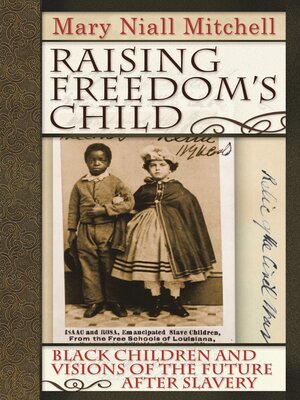Raising Freedom's Child
ebook ∣ Black Children and Visions of the Future after Slavery · American History and Culture
By Mary Niall Mitchell

Sign up to save your library
With an OverDrive account, you can save your favorite libraries for at-a-glance information about availability. Find out more about OverDrive accounts.
Find this title in Libby, the library reading app by OverDrive.



Search for a digital library with this title
Title found at these libraries:
| Library Name | Distance |
|---|---|
| Loading... |
The end of slavery in the United States inspired conflicting visions of the future for all Americans in the nineteenth century, black and white, slave and free. The black child became a figure upon which people projected their hopes and fears about slavery's abolition. As a member of the first generation of African Americans raised in freedom, the black child—freedom's child—offered up the possibility that blacks might soon enjoy the same privileges as whites: landownership, equality, autonomy. Yet for most white southerners, this vision was unwelcome, even frightening. Many northerners, too, expressed doubts about the consequences of abolition for the nation and its identity as a white republic.
From the 1850s and the Civil War to emancipation and the official end of Reconstruction in 1877, Raising Freedom's Child examines slave emancipation and opposition to it as a far-reaching, national event with profound social, political, and cultural consequences. Mary Niall Mitchell analyzes multiple views of the black child—in letters, photographs, newspapers, novels, and court cases—to demonstrate how Americans contested and defended slavery and its abolition.
With each chapter, Mitchell narrates an episode in the lives of freedom's children, from debates over their education and labor to the future of racial classification and American citizenship.Raising Freedom's Child illustrates how intensely the image of the black child captured the imaginations of many Americans during the upheavals of the Civil War era. Through public struggles over the black child, Mitchell argues, Americans by turns challenged and reinforced the racial inequality fostered under slavery in the United States. Only with the triumph of segregation in public schools in 1877 did the black child lose her central role in the national debate over civil rights, a role she would not play again until the 1950s.







